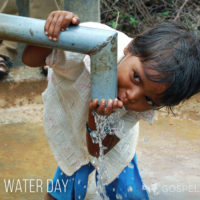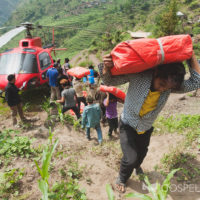RNS — In a world brimming with pressing issues, it is all too easy for certain crises to slip under the radar. We must ask ourselves why some global crises hold the public’s attention, while others quickly fade away. Or worse, some never make it into the worldwide conscience at all.

More than 300 million people worldwide are in need of humanitarian assistance and protection to stay alive. Tragically, an estimated 120 million people have been forcibly displaced due to persecution, conflict, violence, human rights violations and events that seriously disturb the public order.
The global need is great. But as leaders of Christian humanitarian organizations, we too often see incongruence between donor interest and the actual greatest situations of need. It is essential that the church be thoughtful and discerning in how we extend compassion around the world, not merely taking our cues from which crises generate media interest.
Millions of people, bearing God’s very own image, are suffering. As Christians called to love our neighbors as ourselves, it is incumbent upon us to turn our gaze toward these forgotten corners of the world.
A new report from the Integral Alliance — a coalition of 21 Christian humanitarian organizations, including the organizations we lead — explores the reasons why some crises are neglected. The discrepancy in aid is evident as assistance frequently flows toward countries with historical or strategic importance to Western nations, rather than those in greatest need. Yemen, South Sudan, the Democratic Republic of Congo, Afghanistan and Myanmar are just a few examples of countries grappling with prolonged humanitarian crises, which have displaced millions of individuals amid ongoing conflict and harsh environmental conditions.
The reasons behind the neglect are multifaceted. Instead of the distribution of foreign aid tracking closely with the situations of greatest need, the cultural, political and economic interests of donor countries often have an outsized influence on the distribution of aid. As a result, some countries in crisis become isolated from donor countries, aid agencies and potential support. This isolation leads to neglect that can worsen crises and leave countries without an ongoing basis of partnership.
Environmental changes compound these challenges. The impact of climate change is felt most intensely by the poorest and most vulnerable communities, especially those living in fragile and conflict-affected settings.
We live in an increasingly interconnected world, with access to breaking news and information available in real time. However, this can cause many of us to feel helpless as we witness new crises unfolding before our very own eyes. For both private donors and institutions that support aid and development work, this sense of feeling overwhelmed can eventually lead to a state of “donor fatigue.”
As followers of Christ, we cannot turn a blind eye to this suffering. Christ walked among the marginalized, healing the sick, feeding the hungry and comforting the brokenhearted, showing us a countercultural love that transcends borders, cultures and circumstances. In the parable of the good Samaritan, Jesus vividly illustrates that being a neighbor is not merely about geographical proximity or shared nationality, but about showing mercy and compassion.
Moreover, in Matthew 25:35-40, Jesus identifies himself with the vulnerable, saying whatever we do for the “least of these,” we do for him. This powerful message underscores the intrinsic value of every human being and our responsibility to act with love and compassion.
Scripture warns against favoritism in the church — offering special attention to those with wealth and status while ignoring the poor (James 2:1-7). This reminds us that as Christians, we must resist favoritism in the distribution of humanitarian aid, remembering the suffering parts of the world that others have neglected.
We must recognize the global church and listen to leaders from other countries, who intimately know and love their communities. They are the true experts on the “what” and “how” of humanitarian work.
The unity and complementarity of the church also underscore the importance of collaboration. We’re grateful for the ways our respective organizations and the many other Christian humanitarian organizations that form the Integral Alliance support one another, learn from each other and advocate together. Collectively, we’re able to respond in far more humanitarian crises than any one organization could do unilaterally.
Rather than feeling overwhelmed by the enormity of global suffering or being numbed by the sheer volume of information bombarding us daily, we know from Scripture that “even a cup of cold water” has reward (Matthew 10:42). Whether it is donating to relief efforts, advocating for policy change or simply praying fervently, each of us has a role to play in alleviating human suffering.
Let us not be like those who passed by the wounded man on the road to Jericho. Instead, let us emulate the good Samaritan who stopped, cared and acted with compassion. Let us enlarge our hearts and share our resources with those in need, demonstrating the love of Christ through our actions.
(Myal Greene is the president and CEO of World Relief. Carol Bremer-Bennett is the executive director of World Renew. Both organizations are members of the Integral Alliance, of which Bremer-Bennett also serves as board chair. The views expressed in this commentary do not necessarily reflect those of Religion News Service.)
Read more news on Faith Based Organizations and Humanitarian Services on Missions Box.
Source: Religion News Service, Hidden in Plain Sight: The World’s Neglected Humanitarian Crises




